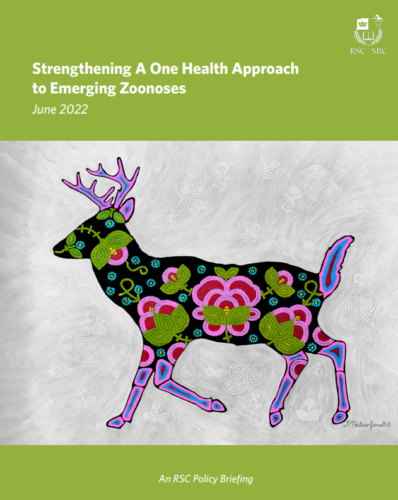
With the COVID-19 pandemic showing the devastating global impacts of diseases that jump from animals to humans, Canada needs to adopt a concerted One Health approach to predict, track and ward off future potential outbreaks.
That’s the key message in a new Royal Society of Canada (RSC) report released last week whose international co-authors include three University of Guelph researchers in the Ontario Veterinary College.
Among its main recommendations for national policymakers and decision-makers in government, academia, agencies and other groups, the report calls for improved One Health governance, expanded pathogen surveillance and biomonitoring, elimination of existing health inequities, and more One Health education and research.
Called “Strengthening a One Health Approach to Emerging Zoonoses,” the report says more pathogens such as the COVID-causing coronavirus are likely to emerge and infect humans.
Growing global travel and trade, urban and agricultural expansion, habitat destruction and other factors bring wild animals into closer contact with people and domestic animals. That increases the risk that disease pathogens harboured in the wild will jump to humans and livestock, with potentially devastating health impacts.
Earlier examples of such zoonotic diseases include international outbreaks of SARS (severe acute respiratory syndrome) and MERS (Middle Eastern respiratory syndrome).
One Health approach brings together human, animal and environmental health

The report calls for a collaborative One Health approach that looks at human, animal and environmental health together rather than focusing on human health alone.
For instance, vaccines and public health measures helped prevent COVID-19 infection and transmission, said report co-author Dr. Claire Jardine, a U of G professor in the Department of Pathobiology and regional director of the Canadian Wildlife Health Cooperative for Ontario and Nunavut. But those measures are largely reactive and focused on human health, missing the wider interactions with animals and ecosystems that may drive the spread of another potential pandemic.
“We need to be proactive to prevent disease emergence from occurring,” Jardine said. “There is clear evidence that disease emergence is associated with land use changes, loss of biodiversity, climate change. We need to preserve ecological integrity.”
Report offers One Health recommendations for Canada
The report makes recommendations in four key areas:
- Strategic – As part of a national strategy, Canada should establish a One Health Council to develop a One Health action plan focused on emerging zoonotic pathogens. Canada also requires a special adviser on One Health, a global One Health security office and an Indigenous engagement and knowledge policy framework.
- Technical – The report calls for funding of the Pan-Canadian Approach to Wildlife Health, approved in 2018. It recommends expanding pathogen surveillance and biomonitoring; improving data collection, analysis and sharing; and committing to other conservation measures and Indigenous-led surveillance activities.
- Equity – As zoonotic diseases affect various groups differently, say the report co-authors, authorities need to engage community groups and communication scholars to better provide information to populations, to collect pertinent social and demographic health data, and to apply gender-based analysis to data.
- Education and research – The report recommends broadening education about One Health among health care providers, schools and universities and prioritizing research – including providing tri-agency One Health funding and developing One Health centres of excellence – on emerging zoonoses.
Report brought together U of G and other international experts

“This report is about recognizing the interconnections and interdependencies between people and other animals – domestic and wild – and all the different places we live in,” said co-author Dr. Jane Parmley, a U of G professor in the Department of Population Medicine. “The emergence of COVID-19 was a result of changes in how we interact with each other in different places.”
The new report was written by a 15-member working group within the RSC Task Force on COVID-19 convened in spring 2020. The working group chair contacted the U of G researchers to take part, including pathobiology professor Dr. Scott Weese, director of the Centre for Public Health and Zoonoses.
Other co-authors are national and international researchers and experts at universities and research institutions in fields including epidemiology, public health, and veterinary and human medicine.
“Further inaction is not an acceptable option – radical change is desperately needed, beginning by reorienting our approach to health and recalibrating our perspectives to restore balance with the natural world in a rapid and sustainable fashion,” says the report. “In Canada, a major paradigm shift in how we think about health is required.”

U of G has identified One Health as a strategic direction for teaching and research across all seven colleges. The University’s One Health Institute comprises some 150 researchers and scholars, including dedicated One Health faculty positions in several colleges. This fall, U of G will launch its new Bachelor of One Health program, the first dedicated undergraduate degree in Canada.
“This landmark report underlines the need to apply One Health perspectives that are a hallmark of research and teaching at the University of Guelph to address critical global health challenges,” said Dr. Malcolm Campbell, vice-president (research).
“The COVID-19 pandemic has demonstrated the importance of understanding the myriad health connections among human and animal populations and our shared natural environment. Our researchers and scholars across campus are engaged in wide-ranging, impactful studies to ensure health and well-being for people across Canada and abroad.”
Contact:
Dr. Scott Weese
jsweese@uoguelph.ca
